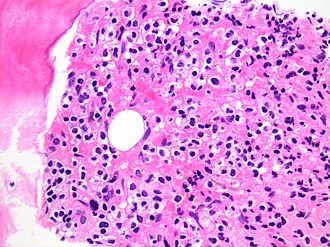Hairy cell leukemia
Jump to navigation
Jump to search
Indolent B-cell neoplasm, abbreviated HCL. Named for the appearances on peripheral blood smears. The vast majority (>95%) harbour the BRAF V600E mutation.[1] Mutations in other parts of the BRAF gene are described, but rare.[2]
In the bone marrow, they are associated with heavy reticulin fibrosis, commonly resulting in dry taps.[3]
Clinical:[4]
- Pancytopenia. Monocytopenia common in earlier disease.
- Splenic enlargement.
- No lymphadenopathy.
- Good prognosis (with treatment), though (likely) not curable.
Gross
Features:[5]
- Huge beefy red spleen.
- Red as white pulp obliterated.
Microscopic
Features:[6]
- Small cells (10-20 micrometers) with "Fried egg"-like appearance:
- Well-demarcated fuzzy cell borders,
- Clear/whispy cytoplasm and,
- Central round nucleus.
- Peri-nuclear clearing ("water-clear rim"[7]) -- key feature.
DDx:
Images
www:
- HCL - bone marrow (nlm.nih.gov) from Holland-Frei Cancer Medicine (nlm.nih.gov).
- HCL - several images (upmc.edu).
- HCL - another case with several images (upmc.edu).
- HCL in the spleen (webpathology.com).
IHC
Features:[8]
- CD20 +ve, CD11c+ve, CD25 +ve, CD103 +ve, CD123 +ve, cyclin D1 +ve, DBA44 +ve
- Annexin A1 +ve (only useful in heavy bone marrow infiltration as it is also positive in T-cells and granulopoietic cells)
- TRAP - tartrate-resistant acid phosphatase (historically histochemically, now immunohistochemically)
- HBME1[9]
- BRAF V600E mutation-specific antibody
- CD5 -ve.
Flow cytometry:
- CD19 +ve, CD11c +ve, FMC7 +ve.
See also
References
- ↑ Ahmadzadeh, A.; Shahrabi, S.; Jaseb, K.; Norozi, F.; Shahjahani, M.; Vosoughi, T.; Hajizamani, S.; Saki, N. (Sep 2014). "BRAF Mutation in Hairy Cell Leukemia.". Oncol Rev 8 (2): 253. doi:10.4081/oncol.2014.253. PMID 25992240.
- ↑ Tschernitz, S.; Flossbach, L.; Bonengel, M.; Roth, S.; Rosenwald, A.; Geissinger, E. (May 2014). "Alternative BRAF mutations in BRAF V600E-negative hairy cell leukaemias.". Br J Haematol 165 (4): 529-33. doi:10.1111/bjh.12735. PMID 24433452.
- ↑ Galani, KS.; Subramanian, PG.; Gadage, VS.; Rahman, K.; Ashok Kumar, MS.; Shinde, S.; Mahadik, S.; Ansari, R. et al. "Clinico-pathological profile of Hairy cell leukemia: critical insights gained at a tertiary care cancer hospital.". Indian J Pathol Microbiol 55 (1): 61-5. doi:10.4103/0377-4929.94858. PMID 22499303.
- ↑ URL: http://www.ncbi.nlm.nih.gov/bookshelf/br.fcgi?book=cmed&part=A34022. Accessed on: 20 August 2010.
- ↑ Mitchell, Richard; Kumar, Vinay; Fausto, Nelson; Abbas, Abul K.; Aster, Jon (2011). Pocket Companion to Robbins & Cotran Pathologic Basis of Disease (8th ed.). Elsevier Saunders. pp. 326. ISBN 978-1416054542.
- ↑ URL: http://emedicine.medscape.com/article/200580-diagnosis. Accessed on: 18 August 2010.
- ↑ URL: http://www.ncbi.nlm.nih.gov/bookshelf/br.fcgi?book=cmed&part=A34022. Accessed on: 20 August 2010.
- ↑ URL: http://www.ncbi.nlm.nih.gov/bookshelf/br.fcgi?book=cmed&part=A34022&rendertype=table&id=A34029. Accessed on: 20 August 2010.
- ↑ "Monoclonal antibody HBME-1 reacts with a minor subset of B cells with villous surface and can be useful in the diagnosis of hairy cell leukemia and other indolent lymphoproliferations of villous B lymphocytes". Virchows Arch. 463 (6): 787–94. December 2013. doi:10.1007/s00428-013-1490-5. PMID 24092261.



